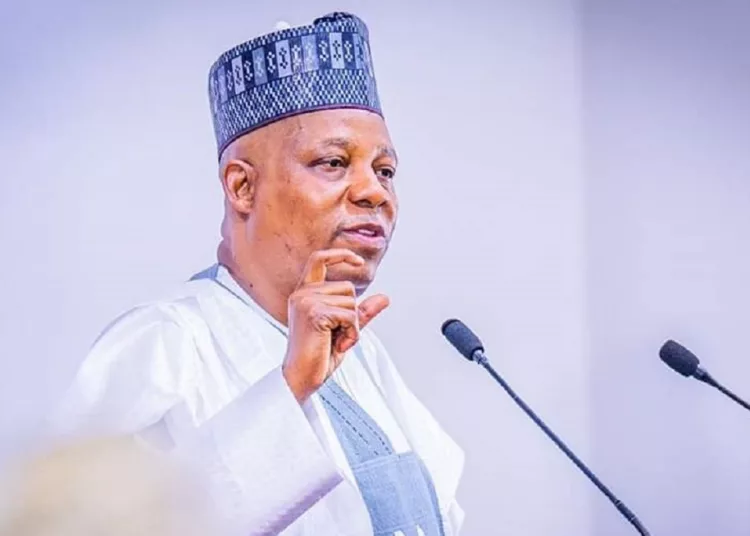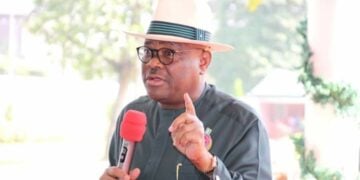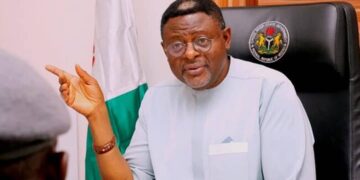The Vice President, Senator Kashim Shettima, has implored development partners and other stakeholders to bridge systemic inequalities and foster an inclusive, unbiased financial system that benefits all Nigerians irrespective of gender or geography.
In this regard, he identified some unsettling gaps yawning for serious attention, including low penetration of digital financial services among women, just as he listed some socio-economic barriers behind the inequalities including low incomes, limited education, and restricted access to financial tools like credit and insurance.
The Vice President gave the charge on Wednesday during the inaugural Development Partners Roundtable on Economic and Financial Inclusion at the Presidential Villa, Abuja.
VP Shettima, who was represented by the Deputy Chief of Staff to the President (Office of the Vice President), Senator Ibrahim Hassan Hadejia, in a statement by his spokesman, Stanley Nkwocha, warned that Nigeria’s vision of building a $1trillion economy by 2030 will remain an illusion except the private sector and development partners were fully engaged.
He stated: “We have come this far because we are continually assessing the extent of economic and financial inclusion in Nigeria. However, the results of this assessment reveal some disturbing gaps that demand our urgent attention. One such gaps is the low penetration of digital financial services among women—only 23% compared to 43% for men.
“This, as we have learned, is driven by socio-economic barriers such as low income, limited education, and restricted access to financial tools like credit and insurance. Women in the northwest and northeast are particularly disadvantaged. The task before us, then, is clear: to bridge these systemic inequalities and foster an inclusive, equitable financial system that benefits all Nigerians, regardless of gender or geography.”
Senator Shettima, however, expressed optimism that the inaugural roundtable will provide a fertile ground for meaningful conversation that would “pave the way for a future where every Nigerian is a significant part of the nation’s financial data.”
He continued: “This roundtable is yet another important opportunity to harness our collective potential and chart a sustainable path forward. It is designed to provide a holistic view of the obstacles impeding economic and financial inclusion in Nigeria.
“As we engage in discussions today, I invite all of us to join hands, collaborate, and align our efforts in crafting lasting solutions. Whatever we do as a government, we know it cannot materialise fully unless we work together with you—our development partners, the private sector, and all stakeholders committed to progress.”
The VP hinted at the inauguration of a Presidential Committee for the Implementation of the Aso Accord, saying it will guarantee the success of the initiative championed by President Bola Tinubu.
“Distinguished ladies and gentlemen, to guarantee the success of the transformative initiatives championed by His Excellency, President Bola Ahmed Tinubu, I am pleased to announce the inauguration of a Presidential Committee for the Implementation of the Aso Accord.
“It is my honour to chair this Governance Committee, which will primarily consist of the esteemed signatories to the Aso Accord, reflecting our collective commitment to ensuring its success. The Committee will be backed by a dedicated secretariat housed within the Office of the Vice President,” he noted.
Noting that discussions on the state of economic and financial inclusion in Nigeria had become a matter of priority at the National Economic Council (NEC) since April of this year, VP Shettima said, “The committee will report to the NEC on a quarterly basis to ensure that the integrated framework we have established not only implements the Aso Accord effectively but also achieves its ambitious goals.
“Once again, I call on all development partners here today to collaborate with this team to ensure the successful implementation of the Aso Accord. Your support is critical to this mission. We will rely on your technical expertise and continued assistance in accelerating the implementation of specific programmes and initiatives. None of us can deliver on this task in isolation,” he added.
Earlier, the Deputy Governor of Bayelsa State, Mr Lawrence Ewhrudjakpo, who spoke on behalf of the subnationals, commended President Tinubu for giving Nigeria a visionary leadership.
He said the successes being recorded by the nation in the economic and other sectors show that Nigeria is on the right track.
The deputy governor, who represented the Bayelsa State governor, maintained that rural communities should be well accommodated in the scheme of things to enhance inclusive development.
Minister of Livestock Development, Idi Maiha, called for effective strategies to include more farmers, petty traders and others who are in poor financial stages, in the financial inclusion programme in order to achieve its goals.
Minister of State for Humanitarian Affairs, Dr Yusuf Sununu, who said the ministry plays a big role in providing financial intervention and inclusion, added that the ministry will ensure social justice, environmental protection and growth through its social intervention programmes like Conditional Cash Transfer and School Feeding.
He assured beneficiaries of accountability and transparency in the implementation of all the programmes of the ministry.
On his part, Technical Adviser to the President on Economic and Financial Inclusion, Dr Nurudeen Zauro, said the roundtable was a defining moment for the financial inclusion strategy of the Nigerian government.
“Today’s gathering is a defining moment in our collective journey towards creating a more equitable, inclusive and prosperous Nigeria. In this hall, we have stakeholders comprising individuals and institutions who are united by a shared commitment to transforming lives through inclusive, economic and financial systems in Nigeria,” he said.
Dr Zauro added that the Aso Accord that seeks to promote financial inclusion is also a blueprint for action guided by the drive to unlock full potential and enhance socio-economic growth, leading to the building of a resilient and inclusive future for all Nigerians.
On her part, the Deputy Chairperson of the African Union Commission, Monique Nsanzabaganwa, hailed Nigeria’s reforms, which she said are feasible.
She congratulated Nigeria for implementing the Aso Accord on Financial Inclusion, just as she solicited more support for women and MSMEs.











